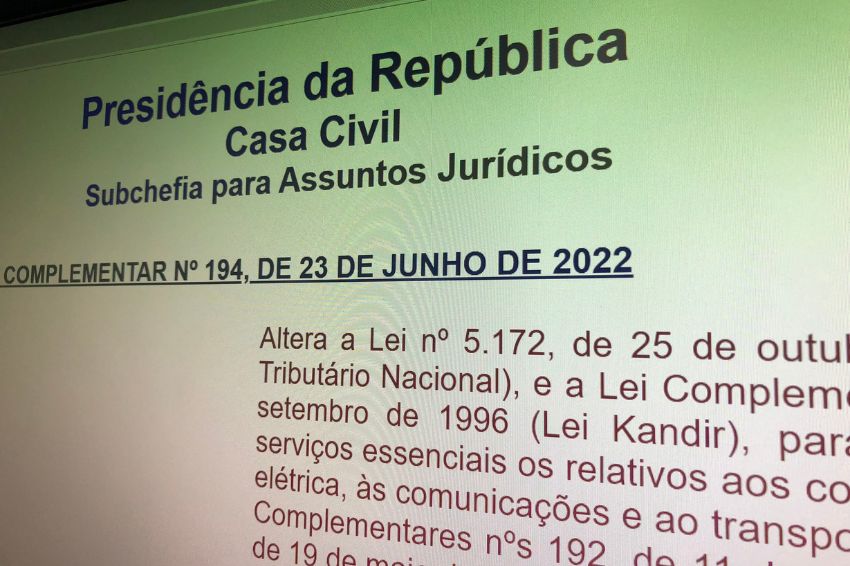In collaboration with João Paulo Marçal
Recently, the LC 194/2022 (Complementary Law No. 194/2022) which brought changes in the tax treatment to be given to operations with fuels, natural gas, electricity, communications and transport services, changing the CTN (National Tax Code) and the Law Supplementary nº 87/96, also known as the “Kandir Law”, directly affecting the collection of ICMS, as they are general rules of tax law.
The legislation above defines that the aforementioned goods and services must be legally treated as essential and indispensable, prohibiting the application of a higher ICMS rate to operations in general, and specifically to operations with electrical energy, changes its calculation basis, putting an end to the discussion regarding the incidence of ICMS on the TUSD (Tariff for Using the Distribution System) and TUST (Tariff for Use of the Transmission System) and sectoral charges.
The change in the ICMS rate on electrical energy
ICMS, a state tax, is levied on the circulation of goods and on interstate and intercity telecommunications and transport services. By constitutional determination, one of the principles that governs the aforementioned tax consists of the principle of selectivity.
The aforementioned principle determines that ICMS rates must be defined according to the essentiality of the good that is being achieved by taxation. It turns out that this principle is not correctly observed by state legislators, establishing rates for operations with electrical energy higher than the general ones, and which reach 30% depending on the State.
In order to correct these distortions, the STF (Supreme Federal Court) recognized through Extraordinary Appeal No. 714.139/SC, submitted to the general repercussion technique and, therefore, mandatory compliance, that the ICMS rate higher than operations in general relating to the circulation of electrical energy is unconstitutional.
The effects of the STF decision were modulated, so that its application would only occur from the 2024 financial year onwards, especially considering the impact of this rate reduction on the public coffers of the States and the Federal District.
The legislative change – ignoring the impact of the reduction in the budget of federative entities – by following the precedent established within the scope of the STF, determined that for operations with electrical energy, the setting of ICMS rates cannot be higher than those assigned for operations in general , subject to the rates of 17% or 18%.
With the recent modification, it is expected that the States will adapt their internal legislation, following the example of the State of São Paulo, which recently issued a newsletter by the Department of Finance and Planning highlighting the reduction of ICMS to 18% relating to operations with electrical energy intended for residential consumers with monthly consumption above 200 kWh, which was previously taxed at the rate of 25%, representing a reduction in the nominal rate of 7%.
Modifications to the ICMS calculation basis for electrical energy
Notwithstanding the change in the ICMS rate, another innovation in LC 194/2022 consists of the direct change in the calculation basis of the ICMS levied on electrical energy, with an express provision for the ICMS to not be levied on TUSD and TUST, a long-standing claim from taxpayers and which has been pending judgment by the STJ (Superior Court of Justice) for five years, suspending the national progress of all processes related to the topic.
The second change in the ICMS calculation basis refers to the non-incidence of sectoral charges. As you know, energy tariffs are regulated and defined by ANEEL (National Electric Energy Agency), and are also made up of sectoral charges. According to the letter of LC 194/2022, it is expected that the calculation basis of the TE (Energy Tariff) – must also be reduced for the purposes of ICMS incidence.
The changes represent a substantial reduction in ICMS taxation on electrical energy operations.
Validity of LC 194/2022 and its application by states
Despite having been filed by the States of Pernambuco, Maranhão, Paraíba, Piauí, Bahia, Mato Grosso Do Sul, Rio Grande Do Sul, Sergipe, Rio Grande Do Norte, Alagoas, Ceará and the Federal District, a direct action of unconstitutionality (ADI 7.195 ) in light of LC 194/2022, it is our opinion that it does not contradict the constitution.
The more daring may come to understand that consumers have their rights guaranteed immediately, whether in relation to the rate limitation or also the reduction of the ICMS calculation basis for electrical energy, as it is a complementary law that has regularly gone through the approval rite. legislation provided for in the federal constitution, but they forget the history of similar situations.
The ICMS Agreement 16/2015 is one of these examples well known by the distributed generation sector. Even after their publication in 2015, the standards were only received by some of the ratifying States after a few years. Another example is the collection of ICMS-DIFAL, which after the publication of Complementary Law 190/2022, validated the state's internal rules for its effectiveness.
There is no shortage of examples of States that have already announced the reduction of the ICMS rate through internal regulations – which validates the statement that it is necessary to wait for the reception of LC 194/2022 by the States for its effectiveness – such as Minas Gerais, through of Decree No. 48,456 of July 1, 2022, which reduced the ICMS rate on electrical energy to 18%.
Impacts for different agents in the regulated and free market
Regulated market
In the regulated market, the news is seen with optimism, as it directly affects the pockets of consumers, who are relieved by the reduction in the incidence of ICMS, both in relation to the rates and its calculation base.
Distributors are not directly affected, as ICMS is charged to end consumers for the same and passed on to state public coffers. However, as the taxpayer responsible for this tax, they must interpret, calculate, collect and deliver to the public coffers the correct amount of ICMS due. But would Distributors be comfortable with all the changes implemented by LC 194/2022?
It is worth remembering that ANEEL Normative Resolution No. 1,000/2021 is currently in force, and that in its art. 323, establishes the distributor's duty to return double overcharged amounts, including taxes, unless for a reason attributable to a third party and which demonstrates the adoption of appropriate measures to mitigate the possibility of overbilling.
It is expected that the distributors will provoke the States to express their views on the validity of the changes introduced by LC 194/2022 and details of the ICMS calculation basis, which, according to the letter of the law, must eliminate values for transport and sectoral charges in energy operations. electrical.
Regarding the distributed generation market, which belongs to the regulated sector, there are conflicting interests. For consumer-generators who have installed their own distributed generation systems and take advantage of the electricity compensation system, the return on their investment has become even better, as they are no longer burdened with ICMS on TUSD and sectoral charges.
For entrepreneurs who invested in assets to be leased to third parties, tax chaos has always been beneficial.
This is the case of shared generation entrepreneurs who have generation assets in States that grant exemption from ICMS for shared generation, and that price the value of the efficiency brought to their customers including ICMS on the full base (TE + TUSD).
For these, the calculation base subject to the discount has become flatter and consequently their returns must be strongly affected, and it is up to them to seek alternatives to improve their returns via optimization of OPEX and/or CAPEX.
Free market
The premises used for the viability of self-production projects certainly consider the impacts of ICMS for those taxpayers who do not qualify for the said tax, therefore, rates of return on investment must be harmed in some way in relation to previous conditions, in which the impact of ICMS was higher – the greater the value of ICMS saved with the energy solution provided, the more efficiency is brought to the consumer.
For traders, the effect is neutral, as the value of energy is priced without taxes, but it must bring certain complications as they are responsible for issuing invoices and other ancillary obligations, generating doubts about the real amount of ICMS due with the advent of the LC. 194/2022, in addition to suffering pressure from its customers eager to receive the benefits brought by the new legislation at the drop of a hat.
For generators, the changes are also neutral, as they were no longer responsible for collecting ICMS, except if the sale is direct to a consumer within the same State, but the burden in any case falls on the latter.
Conclusion
The changes are drastic and the legal uncertainty is tremendous for the electricity sector, which will take time to adapt, as it has created market rules that now need to be revised.
Assumptions, contracts and procedures must be reviewed urgently. For consumers, they must be aware of their rights, once the overbilling is identified, they must ask the distributor directly to stop the error and make the refund, as recommended in regulatory standards.
For investors in shared generation assets that have impacts, tax planning is an option to reduce impacts with reduced revenue.
More than ever, tax law must be considered in the structuring of electrical energy projects, as well as in the accommodation of tax clauses in energy purchase and sale contracts, known by the market as PPA (Power Purchase Agreement), mitigating impacts arising from changes of LC 194/2022.


















2 Responses
Excellent article.
I would like to take this opportunity to congratulate the lawyer specializing in the electric energy sector and tax law – Dr. Einar Tribuci, for his enlightening summary, bringing light to the topic that is of paramount importance for electric energy consumers, especially for those with AT service. and Medium voltage, with dual pricing (kW and kWh), given the exemption from taxes in the TUSD, which was an old demand from consumers and which had been pending judgment by the Courts of Justice for years.
I also congratulate you at Canal Solar for publishing this material.
Good afternoon…
Att.
RALPH PETTINI
The content shared by Einar Tribuci is very good. I am an electrical engineer and work in the solar energy sector, more specifically in the shared generation modality within SCEE. Whenever I look for taxes charged at MMGD, you come up as a reference on the subject. Congratulations on the shared knowledge!